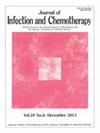Antimicrobial stewardship among Japanese obstetricians and gynecologists: A nationwide questionnaire-based survey of knowledge, awareness, and practice
IF 1.5
4区 医学
Q3 INFECTIOUS DISEASES
引用次数: 0
Abstract
Background
Antimicrobial resistance (AMR) is a global threat; however, data on stewardship awareness and practices among Japanese obstetricians and gynecologists are limited. The aim of this study was to establish a baseline understanding of AMR-related knowledge, attitudes, and practices to identify challenges and guide future interventions in this specialty.
Methods
A cross-sectional anonymous questionnaire survey was conducted among members of the Japan Society of Obstetrics and Gynecology in early 2025. The survey assessed awareness of the national AMR Action Plan, knowledge of antibiotic properties, and self-reported clinical practices, including pretreatment culturing and de-escalation.
Results
In total, 442 physicians responded to the questionnaire. A significant gap between awareness and practice was identified: although 72 % of the respondents reported high awareness of stewardship, only 27.6 % were aware of the high bioavailability of first-generation cephalosporins, and only 19.0 % regularly performed de-escalation. Furthermore, a widespread lack of familiarity with support systems was evident. Only 23.3 % of physicians understood the national AMR Action Plan and only 25.1 % confirmed the presence of an antimicrobial stewardship team (AST) at their institution.
Conclusion
Japanese obstetricians and gynecologists demonstrated a critical disconnect between stewardship awareness and the practical knowledge required for its application, alongside low recognition of national and institutional guidelines. Targeted educational interventions and improved integration with local ASTs are essential to address these gaps.
日本妇产科医生的抗菌药物管理:一项基于知识、意识和实践的全国性问卷调查
抗生素耐药性(AMR)是一个全球性威胁;然而,日本妇产科医生的管理意识和实践的数据是有限的。本研究的目的是建立对抗微生物药物耐药性相关知识、态度和实践的基本理解,以确定该专业的挑战并指导未来的干预措施。方法于2025年初对日本妇产科学会会员进行横断面匿名问卷调查。该调查评估了对国家抗菌素耐药性行动计划的认识、对抗生素特性的了解以及自我报告的临床实践,包括预处理培养和降级。结果共有442名医生参与问卷调查。认识和实践之间存在显著差距:尽管72%的应答者报告对管理工作有很高的认识,但只有27.6%的人知道第一代头孢菌素的高生物利用度,只有19.0%的人定期进行降药。此外,显然普遍缺乏对支助系统的熟悉。只有23.3%的医生了解国家抗菌素耐药性行动计划,只有25.1%的医生确认其所在机构存在抗微生物药物管理小组。结论:日本妇产科医生表现出管理意识与应用管理所需的实践知识之间的严重脱节,同时对国家和机构指南的认可度较低。有针对性的教育干预和改进与地方ast的结合对于解决这些差距至关重要。
本文章由计算机程序翻译,如有差异,请以英文原文为准。
求助全文
约1分钟内获得全文
求助全文
来源期刊

Journal of Infection and Chemotherapy
INFECTIOUS DISEASES-PHARMACOLOGY & PHARMACY
CiteScore
4.10
自引率
4.50%
发文量
303
审稿时长
47 days
期刊介绍:
The Journal of Infection and Chemotherapy (JIC) — official journal of the Japanese Society of Chemotherapy and The Japanese Association for Infectious Diseases — welcomes original papers, laboratory or clinical, as well as case reports, notes, committee reports, surveillance and guidelines from all parts of the world on all aspects of chemotherapy, covering the pathogenesis, diagnosis, treatment, and control of infection, including treatment with anticancer drugs. Experimental studies on animal models and pharmacokinetics, and reports on epidemiology and clinical trials are particularly welcome.
 求助内容:
求助内容: 应助结果提醒方式:
应助结果提醒方式:


